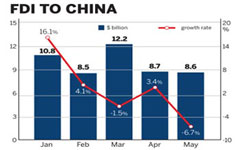It was a time when many successes in reform grew from unlikely situations - mostly impoverished villages, workshops equipped with cast-off machines from state-owned enterprises, and provinces with hardly any modern industry.
 |
 |
If the logic then continues to work now, one would tend to think that probably the new successes of China's ongoing round of reform and transitioning would also come from places other than its frequently highlighted projects.
But of course, they can't come straight from the places that still remain underdeveloped and have yet to see any modernity. Some of the small cities in the more industrialized coastal region, especially the Yangtze and Pearl deltas, may stand a good chance.
In fact, the economy is still growing at 7 percent or more year-on-year despite the severe overcapacity in many old industries. There must be some bright spots in the economy to provide it with new driving forces. And they can't come from the kind of industry that China has known - like just producing garments and shoes for international brands.
According to data from Guangdong province, privately-owned companies' share of its industrial value-added output increased from 27.6 percent in 2010 to 28.3 percent in 2011, then to 39.1 percent in 2012, followed by 40.1 percent in 2013. Some of the towns that once saw an influx of young factory workers are now among the pioneers in China's robotics revolution.
In the meantime, as a rare case in all Chinese mainland provinces, services are contributing more than manufacturing to the local GDP, which would be about $1 trillion in 2014. With total employment of 2.7 million, Guangdong accounts for one-seventh of all China's large service companies.
This, more importantly, was not achieved under the code name of a grand state-level project, such as a "Great Pearl River Delta Industrial Rise" scheme. No extra policy incentives or tax cuts were granted by Beijing.
The author is editor-at-large of China Daily.
